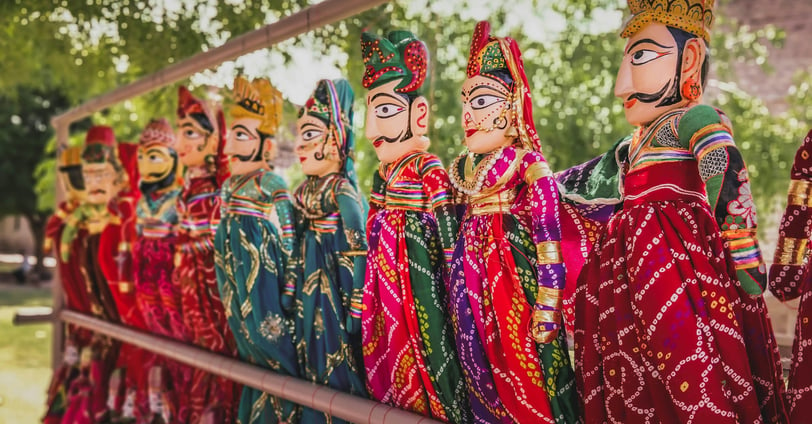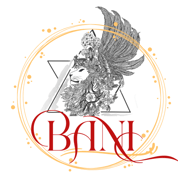Preserving Tradition: The Timeless Allure of Thanjavur Dolls
India's cultural diversity is often celebrated through its crafts, and the iconic Thanjavur dolls are a perfect example of this artistic legacy. Known for their charming wobble and vibrant appearance, these dolls have been enchanting collectors and enthusiasts for centuries. Rooted in the historic town of Thanjavur, Tamil Nadu, they are more than just toys—they symbolise tradition, craftsmanship, and a deep connection to cultural storytelling.
QARM
Team BANI
11/26/20243 min read


In a world increasingly dominated by mass production, the revival and preservation of traditional crafts like Thanjavur dolls hold immense significance. These vibrant figurines continue to captivate with their unique features, blending artistry and heritage. This blog explores the history, craftsmanship, cultural relevance, and contemporary revival of Thanjavur dolls, shedding light on their enduring appeal.
A Legacy in Clay: The History of Thanjavur Dolls
1. Origins and Evolution
The origins of Thanjavur dolls date back to the 19th century during the rule of the Maratha dynasty in Tamil Nadu. It is believed that these dolls were initially created as temple offerings and later evolved into popular decorative items. Over time, they came to symbolise the rich heritage of Thanjavur, blending influences from Indian mythology and daily life.
2. The GI Tag Recognition
In 2008, Thanjavur dolls were granted a Geographical Indication (GI) tag, securing their authenticity and safeguarding their cultural identity. This recognition not only highlighted their traditional value but also provided a boost to artisans striving to keep the craft alive.
Distinctive Features of Thanjavur Dolls
1. Bobbing Head Magic
One of the most captivating features of Thanjavur dolls is their wobbling or bobbing heads, which move independently when touched. This characteristic is achieved through a centre of gravity design, making the dolls appear as if they’re gently nodding—a trait that has earned them the nickname "dancing dolls".
2. Handmade and Eco-Friendly
Thanjavur dolls are crafted using clay, plaster of Paris, or papier-mâché, painted with vibrant natural dyes. This eco-friendly approach not only ensures sustainability but also aligns with the increasing demand for environmentally conscious products.
3. Depictions of Mythology and Daily Life
The themes of Thanjavur dolls often revolve around Hindu deities, royal court scenes, and village life, offering a glimpse into India’s spiritual and cultural ethos. Each doll narrates a story, making it a cherished artefact for collectors.
Cultural and Societal Relevance
1. Icons of Indian Festivals
Thanjavur dolls hold a special place during festivals like Navratri, where they are displayed as part of the Golu tradition in South Indian households. Arranged on steps, these dolls become the centrepiece of festive celebrations, fostering community bonding and cultural exchange.
2. Promoting Artisanship
For local artisans, crafting Thanjavur dolls is more than a livelihood—it's a means of preserving their ancestral knowledge. By continuing this craft, they pass on their skills to the next generation, ensuring its survival in the modern age.
3. Tourism and Cultural Diplomacy
Thanjavur dolls are sought-after souvenirs, representing India's artistic prowess on global platforms. Their export to international markets highlights their universal appeal and boosts cultural tourism in Tamil Nadu.
Challenges in Preserving the Art
1. Competition from Mass-Produced Goods
The rise of cheap, factory-made replicas poses a threat to traditional Thanjavur doll artisans. These imitations lack the charm and craftsmanship of authentic dolls, leading to diminishing demand for the originals.
2. Decline in Artisan Numbers
With younger generations opting for urban jobs, the number of skilled artisans in rural areas is dwindling. This exodus endangers the continuity of Thanjavur doll-making traditions.
3. Rising Material Costs
The cost of natural dyes and other raw materials has surged in recent years, making it challenging for artisans to sustain their craft without compromising quality.
Revival Efforts and Contemporary Relevance
1. Government and NGO Support
Initiatives by the Tamil Nadu Handicrafts Development Corporation and various NGOs have provided financial and marketing assistance to artisans, helping them adapt to modern markets.
2. Integration into Modern Decor
Designers and interior decorators are incorporating Thanjavur dolls into contemporary aesthetics, blending tradition with modernity. These dolls are now used as statement pieces in homes and offices, appealing to younger audiences.
3. E-Commerce Boost
Platforms like Amazon and Etsy have made Thanjavur dolls accessible to a global audience. Artisans now have the opportunity to reach wider markets, increasing their visibility and income.
Balancing Tradition and Innovation
While preserving the authenticity of Thanjavur dolls is essential, innovation is equally important to ensure their relevance in modern times. Introducing new themes, experimenting with materials, and incorporating customer feedback can help these dolls retain their charm while appealing to contemporary tastes.
Celebrating the Heritage of Thanjavur Dolls
Thanjavur dolls are more than just artistic creations; they are living embodiments of India’s cultural and ecological heritage. As they continue to captivate audiences with their timeless charm, it is crucial to support the artisans who keep this tradition alive. By celebrating and investing in Thanjavur dolls, we contribute to the preservation of a legacy that transcends generations.
For those seeking authentic Thanjavur dolls, consider visiting platforms like Poompuhar or exploring local artisan collectives in Tamil Nadu. Every purchase is a step towards sustaining this beautiful art form and the stories it tells.
BANI
An Interview Based Premium Quarterly Magazine That Ignites Your Dreams, Passions and Aspirations
CONNECT WITH US
SUBSCRIBE
© 2024. All rights reserved.
Voice For Change
SECTIONS
WINGS
QUICK LINKS
CONTACT INFORMATION
emagofficial@baniskg.in
